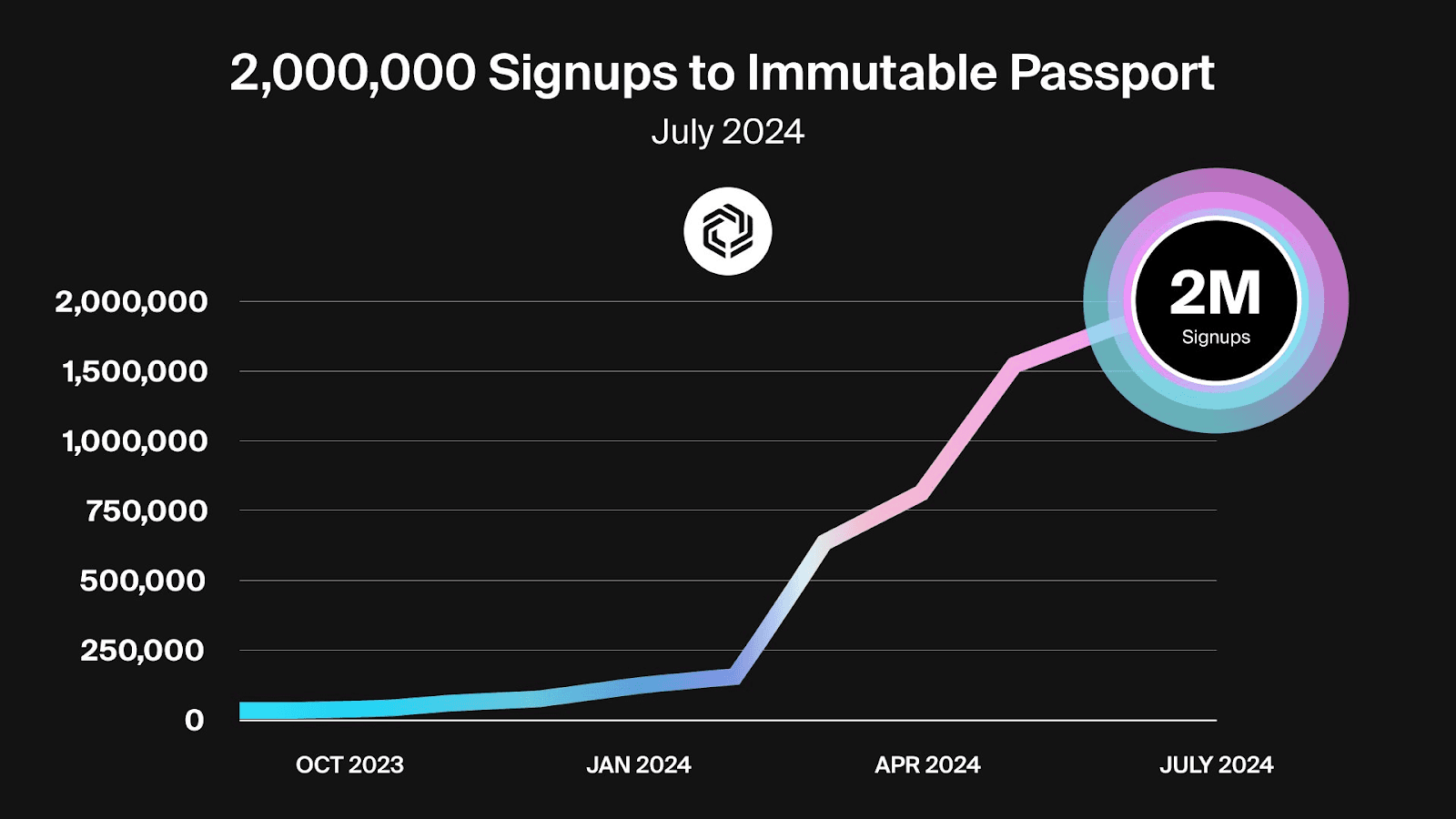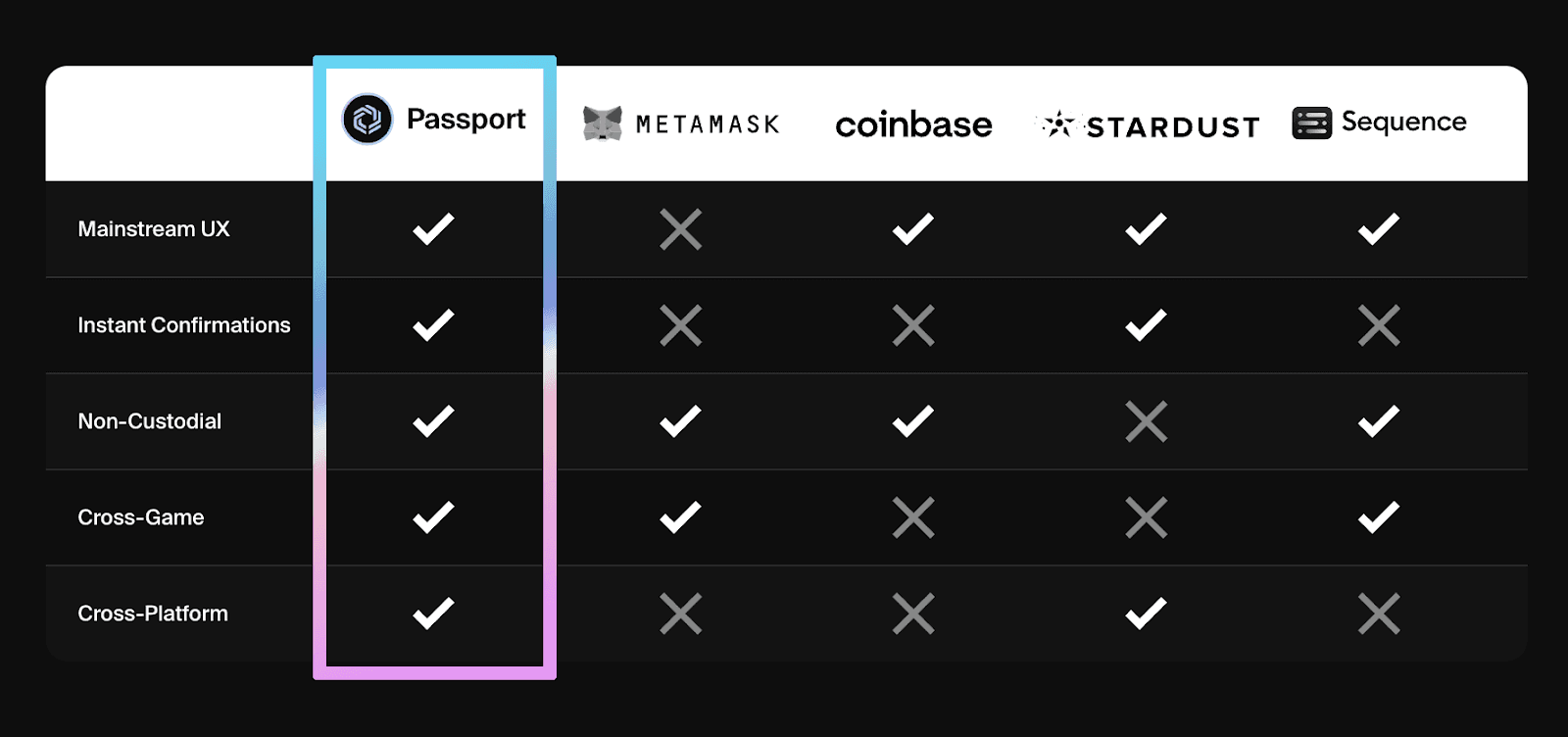Company News
Immutable Passport: Building the Ultimate Web3 Gaming Wallet
Aug 26, 2024



Immutable Passport is on fire.
After hitting the 1 million signup mark earlier this year, we've now blasted past 2 million.
This explosive growth is a clear signal that gamers and developers are hungry for a wallet solution that finally bridges the gap between web3 complexity and web2 simplicity.
As we celebrate this latest milestone, we're taking you behind the scenes for an exclusive conversation with Ignatius Widjaja, Head of Blockchain at Immutable and the product lead behind Immutable Passport, to unpack the challenges and innovations driving the ultimate web3 gaming wallet.

From the core design principles driving Passport's development to the intricate challenges of balancing security with player experience, let’s dive into Ignatius’ unique insights into building a wallet for the next wave of web3 gamers.
Immutable Passport is the only gaming-focused web3 wallet
Web3 is filled with wallets, but none are optimized for gaming.
General-purpose wallets like MetaMask or Rabby, or hardware solutions like Ledger excel in their domains, but they often create friction in gaming experiences. Immutable recognized this gap and developed Passport to specifically address the unique needs of gamers and developers in the blockchain space.

Ignatius emphasized that Passport is not aiming to be the sole crypto wallet for the web3 space, but rather to be the premier solution for web3 gaming. As he explains, "We're not trying to be the end-all-be-all crypto wallet in the space itself, but we do know we are uniquely positioned to be the best web3 gaming wallet."
The vision for Passport is to seamlessly integrate with player’s' existing wallet setups. As Ignatius notes, "You can securely store your assets in a hardware wallet like Ledger. With Passport, you can delegate read-only access, keeping your assets in cold storage while conveniently leveraging them in-game.” This allows players to leverage Passport's gaming-optimized features while still connecting with their preferred wallet solutions.
By complementing the broader web3 ecosystem rather than competing with it, Passport aims to enhance the overall experience for web3 gamers, providing a frictionless interface that builds upon players' existing wallet setups.
Achieving this vision requires a solid foundation - one built on key principles specifically tailored to the needs of gamers and developers.
Immutable Passport enables an interoperable, seamless and secure web3 gaming experience
Ignatius outlines three key design principles that guides the development Passport:
"The number one principle guiding us is the universal interoperability of gaming assets across all games and applications that support Passport," Ignatius explains.
Unlike standalone, often custodial, wallets within individual game ecosystems, Passport enables seamless asset movement between supported games and marketplaces. “This also essentially solves the cold start problem, as new games can tap into existing Passport players and their liquidity.”
"Second is the immersive gaming experience," says Ignatius. Passport aims to provide the smooth user experience of custodial wallets (i.e. headless, no login and/or transaction confirmations) without compromising on true non-custodial asset ownership. This balance is crucial for onboarding mainstream gamers who prioritize gameplay over blockchain interactions.
this is the future of gaming - every shot is on chain pic.twitter.com/eFavYC0t4D
— nick greenawalt (@motionbynick) May 15, 2024
"Finally, we don't compromise on security," Ignatius stresses. Passport implements robust security measures without sacrificing player experience, addressing:
At-rest security for stored assets – such multi-factor authentication (MFA) and protecting against session/token theft post authentication via malware).
In-flight security for transactions – transaction simulation and validation ensure that users are protected both during and prior to signing messages or transactions.
With these guiding principles in place, Passport is uniquely positioned to tackle the complex challenges of web3 gaming and scale to millions of new web3 gamers.
Scaling Immutable Passport for mass adoption
As Passport races towards mainstream adoption, the team is laser-focused on security and scalability. Ignatius outlines some of the challenges they face:
Achieving a seamless, chain-agnostic player experience
More and more games are going multi-chain, with the biggest games building dedicated chains for specific game ecosystems. "The challenge is keeping that immersive gaming experience across multiple chains,” says Ignatius. The goal of Passport is to keep the user experience smooth and consistent, regardless of the underlying chain.
Ignatius paints an ambitious vision for Passport's future:
"If we can perfect that solution and that experience, then that could be extremely powerful. Imagine an immersive gaming experience, universal interoperability across N-number of EVM chains, which sync Passport state, you don't have to worry about exactly where you're transacting, per se."
This level of seamless interoperability would allow gamers to move their assets and identity across different games and chains effortlessly. Achieving this involves solving complex technical challenges in state management and cross-chain communication, but the potential benefits for gamers are enormous.
Achieving ecosystem compatibility through account abstraction
While primarily focused on gaming, the team recognizes the importance of compatibility with the broader web3 ecosystem. This approach allows Passport to balance gaming-specific features with the ability to integrate seamlessly with other blockchain applications.
Looking ahead, the team is planning for even greater ecosystem integration through account abstraction. "Though Passport implements its own type of account abstraction, we do at some point want to be fully compatible with the rest of the ecosystem to reduce fragmentation by adopting an account abstraction standard that other wallets are also using," Ignatius explains. This forward-thinking strategy ensures that Passport will evolve alongside the rapidly changing web3 landscape.
Implementing account abstraction opens the door to advanced features, all without compromising the user experience. For the Passport team, maintaining this balance is crucial.
As Ignatius puts it, "To us, it's about finding a balance between offering a universal interoperable solution for gaming assets, complementing other wallets in the ecosystem, achieving standardization, all while still offering an immersive gaming experience." This philosophy guides Passport's development, ensuring it meets the needs of gamers today while preparing for the innovations of tomorrow.
The road ahead for Immutable Passport
Passport's rapid growth to 2 million players marks a pivotal moment in the evolution of web3 gaming. But for Ignatius and the Immutable team, this milestone is just the beginning of a much larger vision.
The challenges ahead are significant: seamlessly bridging multiple blockchains, synchronizing wallet states across diverse ecosystems, and maintaining an intuitive user experience as complexity grows behind the scenes.
Yet it's precisely these challenges that drive innovation.
Alongside these technical hurdles, Immutable continues to invest heavily in security measures. The team is working on implementing sophisticated multi-factor authentication options, including authenticator apps and passkeys. Additionally, they're developing sophisticated in-flight transaction validation checks to further protect users from potential threats.
Ignatius' vision extends beyond creating a better wallet. It's about fundamentally reimagining the relationship between gamers and their digital assets. As he puts it: "We're creating the foundation for a new era of gaming - one where players truly own their digital experiences without sacrificing immersive gameplay."
This philosophy underpins every aspect of Passport's development, from its core design principles to its ambitious scaling plans. As web3 gaming stands on the cusp of mainstream adoption, Passport is positioned to be the bridge that millions of players will cross to enter this new digital frontier.
The journey from here promises to be as exciting as it is unpredictable.
But one thing is certain: with Passport, Immutable is not just preparing for the future of gaming – we’re actively building it.
